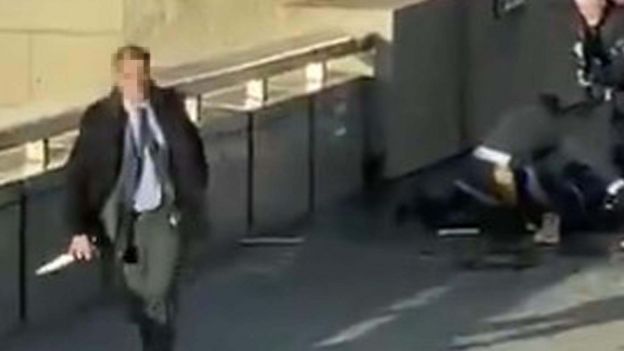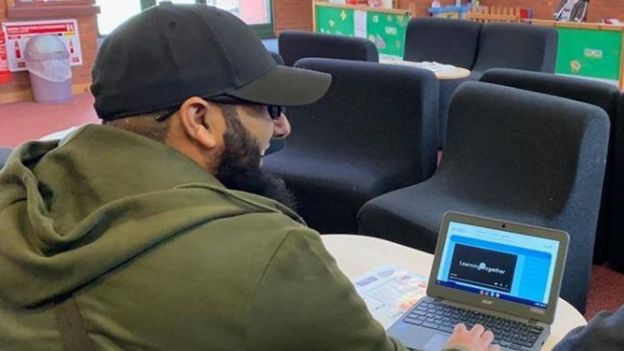Rehabilitating Jihadists
"I was on the bus coming southbound over London Bridge. We had just pulled away from the bus stop when the bus came to a sudden stop, because there were people running across the bridge into the road, sort of looking over their shoulders and filming behind them."
"It looked like there was a fight going on ... people tussling with each other. And then you realize it was police wrestling with one tall bearded man. I had my baby with me, so I moved her behind the stairwell to be safe. Then there was two shots or two loud pops. I think they were gunshots."
"[I saw the attacker lying on the ground and pulling his coat back, revealing] some sort of vest underneath. The police then really quickly moved backwards."
Karen Bosch, London stabbing aftermath witness
"I jumped in and kicked him [the knife-assailant] in the head to make him release his knife. A few others did so."
"He was shouting 'get off me, get off me'."
Stevie Hurst, London tour guide
"Our Counter Terrorism detectives will be working 'round the clock to identify those who have lost their lives, to support all the victims and their families."
"We are also working at full tilt to understand exactly what has happened and whether anyone else was involved."
London police chief Cressida Dick
"I ... want to pay tribute to the extraordinary bravery of those members of the public who physically intervened to protect the lives of others."
"This country will never be cowed, or divided, or intimidated by this sort of attack."
British Prime Minister Boris Johnson
 |
| A police officer cordons off a street close to the scene of Friday's deadly stabbings at London Bridge. (Facundo Arrizabalaga/EPA-EFE) |
Police Chief Cressida Dick might want to have a conversation with the head of MI5. Which was ostensibly tracking the knifer, a known Islamist terrorist whose early release from a lengthy prison sentence for conspiring to bomb on behalf of al Qaeda, the London Stock Exchange, allowed him to attend a workshop designed to guide wannabe terrorists such as he back from the dark to the light taking place at Fishmongers' Hall, which he used as a launching point for his obviously planned knife attacks.
Earlier this month Britain had decided, likely on the advice of its Intelligence services, to lower the national alert status from "severe" to "substantial", the lower rating not necessarily an opportunity to relax, but that the terror threat level in the U.K. rated somewhat less vigilance. While the new rating still judged an attack to be likely, it was not quite so much as the previous level. One step behind the mindset of those who fester in bleak hatred, anxious to kill innocents to prove to themselves and others that jihad is serious business, downgrading aside.
Uzman Khan, the 28-year-old from Birmingham, had more all-encompassing plans than merely stabbing unfortunate passersby in central London; he envisaged his grand role in co-sponsoring a "terrorist military training facility" for the greater glory of Islamist jihad. What he is now known for is killing two people, wounding three others, while wearing a mock suicide belt. His victim count is remarkably high, but would have been far more so, had it not been for the response of witnesses to his attack.
 |
| Witnesses were widely praised for intervening in the attack @HLOBlog/Twitter/PA Wire |
One man had hauled down from the wall at Fishmongers' Hall a narwhal tusk, a long, straight, twisted spiral of a 'tooth', reminiscent of a Unicorn's fabled horn, meaning to use it as a cudgel as he responded to the attack. Khan was wearing an ankle bracelet as part of his pre-release conditions, and presumably he was being tracked. That he was able to arm himself, plan and mount an attack of this magnitude in a public place surely means that he wasn't being monitored as closely as he should have been.
While this can be viewed as a fault of Intelligence services, it can also be viewed from the perspective of staff shortages. As many people on staff to do the required due diligence to ensure that none such as he run amok, terrorizing and slaughtering, there will never be sufficient numbers for the job at hand. Polls taken in Great Britain attest to the large number of sympathizers among the much larger number of British Muslims who feel violence in the name of Islam and its mission to jihad is perfectly acceptable.
As for the proposed "terrorist military academy", in the case of Khan, his Pakistani-born family proves that old adage of the apple never falling far from the tree. Khan's family owns land in Kashmir, the disputed Himalayan geography between India and Pakistan that has been a flashpoint for conflict since India was partitioned for the creation of Pakistan in 1947. A mosque was built on the land and plans were to proceed to "establish and operate a terrorist military training facility" there.
Khan busied himself with the thought of producing "more serious and effective terrorists". Charges against the man and another suspect were of attending operational meetings, fundraising and preparing to travel abroad for the purpose to "engage in training for acts of terrorism", earning him a 16-year-sentence, which British jurisprudence obviously saw fit to reduce by half, giving him early pre-release and the opportunity to practise what he was so eager to preach.
One of the people he stabbed to death was involved as a university graduate student with the Cambridge University conference on prison rehabilitation, which Khan was instructed to attend. For his troubles as a course coordinator for Leaning Together, a prisoners' rehabilitation program hosting the conference at Fishmongers' Hall, Jack Merritt became a sacrifice to Islam, making his killer a martyr whose death and daring exploits in murdering those who attempted to help him, a hero in his native Pakistan.
 |
| Usman Khan appeared as case study in a report by Learning Together |

<< Home